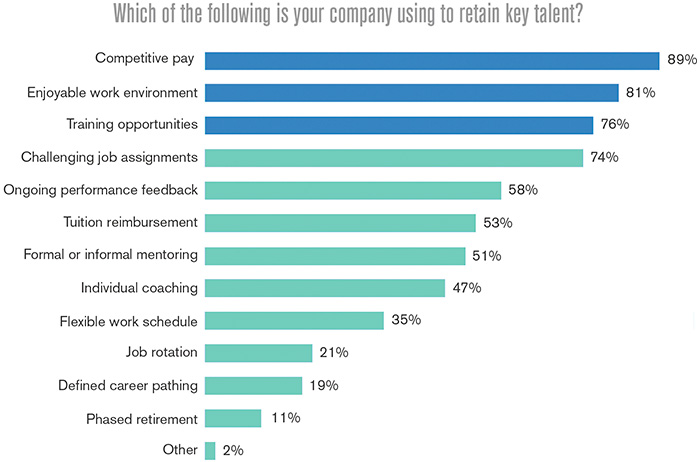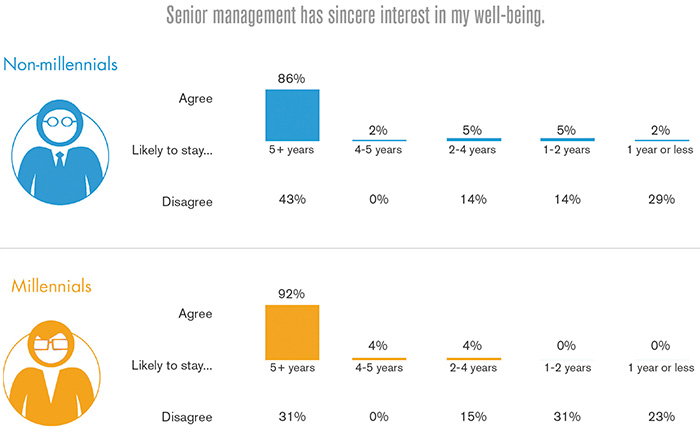
Labor shortages are becoming more prevalent in today's construction industry, and companies need to focus on corporate culture, engagement and work-life quality to attract and retain good people. It has been a long and arduous stretch, but it's now safe to say the Great Recession is a thing of the past for the construction industry. The recession still resounds in the market and the minds of those who experienced it, though. In FMI's recent talent development survey, 86 percent of respondents reported that their companies were experiencing skilled labor shortages. Two years ago, only 53 percent of respondents faced this challenge.
So, how are employers responding to this dilemma? The truth is, they are treating the people problem like a construction project and trying to solve it with a hammer-and-nail solution. Specifically, companies are putting big dollars into training programs focused on sharpening employee skills and competencies.
Training is important and definitely has its place. But if it is not offered as part of a well-designed, individualized career development program, then training is simply a way of paying attention to human "doings" rather than considering employees as human "beings." Ken Wilson, founder of FMI's Talent Development Group, said, "Many companies just seem to want to check off the (training) initiative from their list and convince themselves that they are making a commitment to their people."
With millennials (individuals born between 1980 and 2000) now making up 34 percent of the nation's workforce—a number that is expected to grow to 50 percent by 2020—construction companies are faced with the even greater challenge of attracting and retaining a dynamic, young workforce.
These young people are looking to add value, make an impact and find meaning in what they do. They also want to learn, improve and advance quickly through an organization and understand available career advancement opportunities.
This is particularly relevant for companies in the construction industry, where many firms lack well-defined career tracks, comprehensive talent development programs and effective leadership platforms. According to FMI's 2015 talent development survey, only 19 percent of respondents define career paths for their employees—a human capital area that has been neglected for far too long in the construction industry.
"The young people in this industry are eager to contribute and participate," said Barbara Jackson, director at the Franklin L. Burns School of Real Estate & Construction Management at the University of Denver. "Oftentimes, standard job descriptions and policies stand in the way of them contributing at a level that would bring real value to the companies that they work for. This can result in frustrations, and ultimately people move on to more progressive firms and industries."
Missing the Mark on Employee Engagement
According to FMI's talent development survey, competitive pay, enjoyable work environments and training opportunities are the top three methods that survey respondents use to retain key talent in the construction industry (see Figure 1). Conversely, when we asked millennials in the industry how they stay engaged, they listed competitive pay, work-life balance and personal development as their top choices.
 Figure 1. Methods for retaining key talent in the construction industry
Figure 1. Methods for retaining key talent in the construction industryAre employers missing the mark when it comes to employee engagement in the construction workforce? Offering competitive pay is important—perhaps even a prerequisite in today's tight labor market—but beyond that, companies must present opportunity to their employees in a strategic and compelling way. If that training isn't part of a well-planned career development program, then it quickly becomes an expensive and time-consuming exercise for everyone involved.
Findings from FMI's 2015 millennial study confirm this notion. Of the respondents indicating that they understood their career paths and opportunities within their firms, 81 percent expected to stay more than five years at their company. Conversely, of those respondents not expecting to stay more than five years, one-third were unsure of their responsibilities and expectations in their current roles. It seems that aspirations—more than age—determine why people remain with their companies or move on to new ones. It is evident that millennials care as much as older workers about career opportunities and getting ahead.
Engagement Starts at the Top
Culture and engagement have become strategic priorities in today's competitive business landscape. According to a recent Deloitte study, 87 percent of organizations cited culture and engagement as two of their top challenges. It's no secret that leaders set the tone for engagement in the workplace.
This fact was confirmed in FMI research, where employees (both millennials and non-millennials) who perceived senior management's commitment to their well-being were more engaged and planned to remain long term with their companies (compared to those who didn't feel appreciated or valued by their leaders, seen in Figure 2).
 Figure 2. Senior management\'92s commitment to people is reflected in engagement levels and company loyalty.
Figure 2. Senior management\'92s commitment to people is reflected in engagement levels and company loyalty.In the construction industry, where employee turnover is notoriously high and cyclical due to economic fluctuations and local market conditions, company leaders must build corporate communities that truly inspire and engage employees long term and across all generations. The generational workforce gap may not be as wide as some may think. According to a recent IBM study, much like their predecessors, millennials are interested in job security and stability. Despite popular belief, they aren't poised to switch jobs as soon as another opportunity presents itself. However, these younger workers come from a connected generation that truly values collaboration, teamwork and social opportunities. The question is, how can company leaders create a culture that leverages these strengths, while also engaging older workers and staying true to core missions and aspirations?
The answer to that question lies in the development of sustainable cultural structures that enable organizational connectedness and strong employee engagement. It's not enough to simply purchase a high-end espresso machine for the break room or host a weekly happy hour on Friday evening.
The work environment as a whole must embody daily collaboration that encourages millennials to tap into their connectedness, share new ideas and offer solutions to client problems. Senior leaders must also evoke an established commitment to the workforce's wellbeing by creating a culture of ongoing learning and feedback.
For example, millennials like receiving feedback on a continuous basis because it enables them to understand the impact of their contributions on the organization. It was noted that, "Being noticed for the hard work you are doing is a big deal in the construction industry. When an executive tells you they appreciate your hard work, it really goes a long way."
The construction industry is well-positioned for an infusion of millennial workers. Indeed, the timing is perfect, particularly with the new virtual design and construction tools and integrated project delivery methods requiring higher levels of collaboration among project teams.
Having new, young people focused on a common purpose, effective processes, excellent communication and solid relationships will help engage workers of all ages and transform the industry over time. Other key findings from FMI's survey include:
- Companies in the construction industry lack processes to develop and promote high-performing employees.
- Executives and field manages are expected to have the highest \uc0\u8232 attrition rates over the next five years.
- The majority of firms don\'92t connect training expenditures and performance management metrics.
- Annual performance reviews are a top priority for increasing employee performance and development.
- Having a defined and well-communicated vision is critical to retaining key talent, regardless of age.
What's Next?
Looking ahead, the construction industry must redefine the role of human resources to a much broader approach that gives top human capital executives a seat at the senior leadership table. This will require new tools, metrics and analytical capabilities that translate qualitative workforce information into the quantitative language of growth and profitability.
Tomorrow's human-capital leaders will find ways to combine the strategies, practices and processes needed to overcome obstacles and create a sustainable competitive edge for their organizations. From hire to retire, employees should be aligned with the organization's overall strategic goals. Developing and engaging employees—as well as managing their performance—are critical steps, especially for millennials who want to do more than just punch a clock and take home a paycheck. These individuals are looking to add value, make an impact and find meaning in what they are doing. Construction firms can leverage these realities by ensuring that younger workers have a clear sense of purpose and an understanding of their roles within the larger plan.
So, rather than focusing on outdated stereotypes, employers in the construction industry should take the opportunity to develop workplaces where top talent across all generations can shine and thrive. Starting with a clear and inspiring vision, leaders can pave the way for long-term employee engagement and weave both multicultural and multigenerational human capital strategies into the construction industry workforce. Now is the time to capitalize on each other's strengths, instead of focusing on obsolete stigmas.
